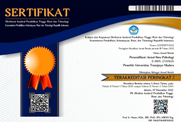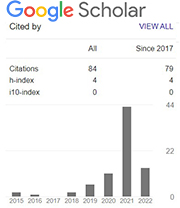Menelaah Pengambilan Keputusan Korban Pelecehan Seksual dalam Melaporkan Kasus Pelecehan Seksual
Abstract
ABSTRACT
Sexual harassment can occur everywhere, whether at work, in public places, or in the educational environment. This research aims to describe (1) the forms of sexual abuse experienced, (2) psychological effects, (3) the decision-making process of victims of sexual harassment, and (4) the expectations of victims of sexual abuse. This research used is qualitative research with phenomenology and in-depth interviews. The subjects in the study are the victims of sexual harassment as many as three women who are aged 21-25 years and who are active students in Malang. The subjects are divided into two categories. The results of the study are the The forms of sexual harrasment, the psychological effects on cognitive, affective, and behavior, the description about the process of decision making for the victims, and the victims hope that researcher describe on the discussion.
ABSTRAK
Pelecehan seksual dapat terjadi di tempat kerja, di tempat umum, maupun di lingkungan pendidikan. Penelitian ini bertujuan untuk menelaah (1) bentuk pelecehan seksual yang dialami, (2) dampak psikologis, (3) proses pengambilan keputusan korban pelecehan seksual,dan (4) harapan korban pelecehan seksual. Penelitian yang digunakan adalah kualitatif dengan pendekatan fenomenologi dan teknik wawancara mendalam. Adapun subjek dalam penelitian merupakan korban pelecehan seksual sebanyak tiga orang perempuan berusia 21-25 tahun dan merupakan mahasiswa aktif di Malang. Hasil penelitian menunjukkan terdapat pelecehan seksual verbal dan non-verbal yang terjadi, dampak psikologis terkait dampak kognitif, afektif, psikomotorik dan perilaku, proses pengambilan keputusan korban yang melaporkan dan tidak melaporkan kasus, serta harapan korban yang dijabarkan dalam hasil dan pembahasan.Keywords
Full Text:
PDF (Bahasa Indonesia)References
Ahrens, C.E. Campbell R, Ternier-Thames, NK, Wasco, SM., Sefl, T (2007) Deciding Whom to Tell: Expectations and Outcomes of Rape Survivors' First Disclosures Psychology of Women Quarterly 31(1):38-49 DOI 10.1111/j.1471-6402.2007.00329.x
Artaria, M.D. (2012). Efek Pelecehan Seksual di Lingkunan Kampus: Studi Prelimenier. Jurnal Bio Kultur, vol.1, no.1. hal 53-72.
Balogh, DW. Kite ME, Pickel, KL., Canel,. D. Schroeder J. (2001). The Effects of Delayed Report and Motive for Reporting on Perceptions of Sexual Harassment. Journal Sex Roles. Vol. 48. DOI: 10.1023/A:1022990530657
Buchanan, N.T& Harrell, Z.A. (2011). Surviving Sexual Harassment: Coping With, Recognizing, and Preventing Unwanted Sexual Behaviors in the Workplace (Surviving Sexual Violence book). Rowman & Littlefiled Publisher: Maryland
Cortina, L.M & Berdajl, J.L. (2008). Sexual harrasment in organizarinons: a decade of research in review. Vol.Imicro approaches
Fisher, B.S., Cullen. F.T., & Turner M.G. (2000). The Sexual Victimization of College Women. Bureau of Jutice. Statistics. US.
Fuadi, A. (2011). Dinamika psikologis kekerasan seksual: sebuah studi fenomenologi Psikoislamika: Jurnal Psikologi Islam, vol. 8, No.2, 191-209
Izzaturrohmah, & Khaerani, N. M. (2018) Peningkatan Resiliensi Perempuan Korban Pelecehan Seksual Melalui Pelatihan Regulasi Emosi Psikohumaniora, Jurnal Psikologi 3(1) 117-140 DOI: http://dx.doi.org/10.21580/pjpp.v3i1.2527
Kirkner, A. Lorenz, K. Ullman, S.E.(2017). Recommendations for Responding to Survivors of Sexual Assault: A Qualitative Study of Survivors and Support Providers. Journal of Interpersonal Violence 1–24 DOI: 10.1177/0886260517739285
Komisi Nasional Anti Kekerasan Terhadap Perempuan: (2020) Catatan Tahunan Kekerasan Terhadap Perempuan 2019. Komnasperempuan.go.id
Kompas (2019) Survei KRPA: 46,8 Persen Orang Pernah Dilecehkan di Transportasi Umum, Mayoritas di Bus. Diakses, 25 April 2020
Lorenz, K. Kirkner, A. & Ullman, S.E. (2019). A Qualitative Study of Sexual Assault Survivors’ Post-Assault Legal System Experiences . Journal Of Trauma & Dissociation. Vol. 20, No. 3, 263–287 https://doi.org/10.1080/15299732.2019.1592643
Moleong, L.J. (2007). Metodologi Penelitian Kualitatif. PT Remaja Rosdakarya: Bandung
McDonald, P. (2012). Workplace sexual harassment 30 years on: A review of the literature. International Journal of Management Reviews, 14, 1–17. http://dx.doi.org/10.1111/j.1468-2370.2011.00300.x
Orchowski, LM & Gidycz CA (2012) To whom do college women confide following sexual assault? A prospective study of predictors of sexual assault disclosure and social reactions. Violence against women, 18(3) 264–288
Quick, J.C., & McFayden, M.A. (2017). Sexual Harrasment: Have We Made Any Progress. Joyrnal of Occupational Health Psychology. Vol. 22 NO. 3 286-298. 1076-8998/17/$12.00 http://dx.doi.org/10.1037/ocp0000054
Ruback, B.R., Greenberg, M.S., & Westcott, D.R. (1984). Social Influence and Crime-VIctim Decision Making. Journal of Social Issues. Vol. 40. No. 1, 1984, pp. 51-16
Sable, M. Danis, F. Mauzy, D. Gallagher, S. (2006) Barriers to reporting sexual assault for woman and men: Perspectives of college student
Wong, K & Christmann, K. (2008). The role of victim decisionmaking in report of hate crime. Safer Communities 7 2, 24-35.
DOI: https://doi.org/10.21107/personifikasi.v11i1.7299
Refbacks
- There are currently no refbacks.
Copyright (c) 1970 Annisa Trihastuti, Fathul Lubabin Nuqul

This work is licensed under a Creative Commons Attribution 4.0 International License.


Personifikasi by Universitas Trunojoyo Madura is licensed under a Creative Commons Attribution 4.0 International License.










